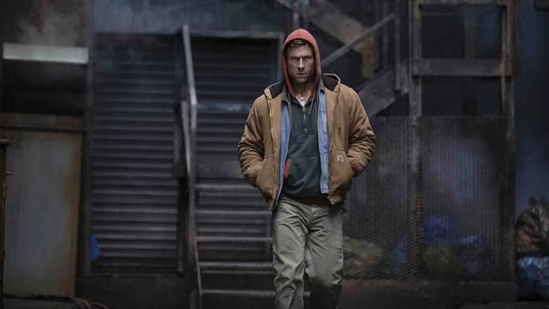The Running Man review: Glen Powell shines in this slick, propulsive and razor-edged crowd-pleaser
Director: Edgar Wright
Cast: Glen Powell, William H. Macy, Lee Pace, Michael Cera, Colman Domingo, Josh Brolin
Rating: ★★★★
Filmmaker Edgar Wright takes another swing at dystopian spectacle with his remake of The Running Man, revisiting the world first imagined by Stephen King (writing as Richard Bachman) and later turned into that wildly camp 1987 Arnold Schwarzenegger vehicle. This time, Glen Powell steps into the crosshairs, armed with Edgar’s pop-slick energy and a story whose 2025 setting suddenly doesn’t feel like fiction anymore.

At its core, The Running Man still follows Ben Richards, an everyday American pushed to the brink by a corporate-run state. Unable to find work after speaking up about unsafe conditions and desperate to afford medicine for his young daughter, he decides to enter “the biggest show on earth,” a televised blood sport that turns human survival into prime-time entertainment. It’s simple: stay alive for 30 days while a team of state-approved assassins hunts you. Win a billion dollars. Lose, and you’re another body on the broadcast.
Edgar keeps the structure intact — the rigged system, the phoney propaganda, the slick studio host (played with oily charm by Colman Domingo) and the cold-eyed puppet master (Josh Brolin). The chase spills across a nation-sized arena, stitched together by rebels, punk manifestos and retro-tech that gives the film its crackling, throwback flavour.
The good
Ed’s propulsion is unmistakable. The action has that trademark sugar-rush rhythm — sharp cuts, needle-drops, breathless momentum. His retrofuturist touches (grainy TVs, VHS tapes, analog glitches) feel both nostalgic and pointed, a reminder of how easily manipulated images can become a weapon. Glen Powell throws himself into the physicality of it all, channeling a Tom Cruise-like intensity as Ben outruns Hunters, propaganda and his own past. And every time the film leans into its satire — the frenzied studio audience, the grotesque contestant bios, the Resistance popping up like pirate broadcasters — the world feels wickedly alive.
The bad
For all its style, the film rarely lands the gut punch you expect from Stephen King’s most eerily prescient premise. Edgar’s irreverence sometimes jolts against the story’s bleakness — inequality, healthcare collapse, state surveillance — leaving scenes that feel tonally split. The episodic midsection drifts, side characters barely register, and Glen’s earnestness can’t always compensate for a character written more as an outline than a fully realised everyman. Worst of all, the film skirts its most troubling question — if everything can be AI-manipulated, what’s the point of the “real” chase? — and its finale feels softened, even evasive.
The verdict
It is a brisk, punchy and built with undeniable craft. But beneath the adrenaline lies a film that never fully confronts the nightmare it’s depicting. Wright is in stride, but not in full sprint — delivering a dystopian ride that entertains consistently, yet stops just short of becoming the razor-edged satire it wants to be.

